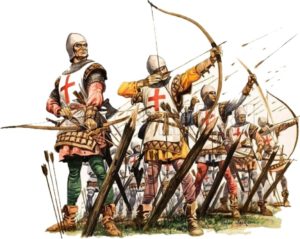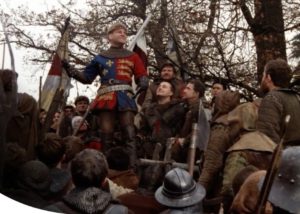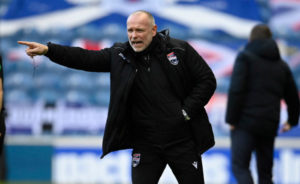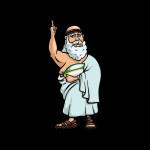What are the skills and qualities that enable a coach or captain/coach to lead their team to great victories against all odds? One of Australia’s greatest ever actors, John Bell, reckons that Shakespeare had this leadership business summed up pretty well with his character King Henry V. Henry crops up in a few of Shakespeare’s plays but, as a gun fighter and captain coach of a top-notch brawling army, he came into his own around the time of the Battle of Agincourt when his English troops gave the French army a good thrashing (much to the bookies surprise).

The Brits, battle-weary and exhausted, came up against a highly trained and heavily armoured French army spoiling to humiliate the uppity poms near the town of Agincourt. The French contingent, thought to be in the area of fifteen thousand strong, should have given the six or seven thousand fighting English, Welsh, and Scots a decent hiding but they blew it! What went wrong?
Shakespeare’s Henry V play gives a large amount of the credit to the exceptional coaching of Harry. Military historians, on the other hand, tend to see a range of factors as enabling the English victory… not least of which were the conditions of the battlefield, the disorganization of the French leadership, the stupidity of the French battle tactics and the British outstanding use of their lightly armoured archers throughout the battle. While there is undoubted truth in these arguments, Harry had to lead a hugely outnumbered, overworked, and underpowered team who had only just concluded a major energy-sapping battle which, while in retreat, found itself staring across a field at an opposition featuring cavalry, heavily armoured foot soldiers, and archers (with an enormous armed support team) led by the cream of France’s fighting aristocracy. The French may have made some pretty dopey moves in the battle and the conditions may have suited the Brits, but it was still going to take some pretty exceptional coaching to get the English soldiers to stiffen their upper lips, to stand their ground, then to mercilessly stick it to the snooty and arrogant French knights.
Leadership – not technical skills
How did Harry inspire his team to such an unlikely and memorable win? If you can believe Shakespeare (and John Bell) it was the outstanding leadership of King Harry. As a youngster, Harry might have been a frivolous twerp (so much so that when Henry V had forwarded his demands to the French crown prior to his invasion of France, the Dauphin got a good laugh out of responding by sending Harry a box of tennis balls) but maturity had refined the bloke’s leadership qualities into someone who the French aristocracy should not have taken lightly.

In his recent series of ABC sponsored Boyer Lectures here is how Bell saw the leadership skills and qualities of King Henry V.
“As an actor/manager with the Bell Shakespeare Company I learned a lot from Henry V as a leader.
- Be a team player
- Play low status and don’t pull rank
- Lead by example
- Listen to everyone in the team
- Be an innovator
- Be bold – take risks – calculated risks
- Be affable… good natured
- Be grateful
- Be decisive – don’t prevaricate
- Have a vision and a plan – and know how to articulate them
- Learn how to delegate – don’t be a one-man band
- Be kind
- Be generous
- Be forgiving
- Be humble – humility is not a passive or craven thing – it’s just the understanding that every life has the same value
Those last qualities have meant more to me the older I get – the more I see of life. And I note that they are the qualities that Shakespeare seems to advocate in his final plays.”

Out of the fifteen traits that Bell identifies as leadership qualities demonstrated by King Harry, only four would come under the category of technical skills. Be an innovator, be bold, be decisive and plan are all biggies in the Harry coaching book, but they are heavily outweighed by the long list of people skills Haz employed to get the very best out of the troops who had to do the fighting for him. Boldness, decisiveness, planning, and innovation (the technical skills) played an important role in the surprise Agincourt victory, for sure. The French barely believed that Harry would be bold enough to even take on the superior Bleus mob and his innovative use of longbow archers (stationed on the wings of the field) to mow down the French heavy armour and cavalry was a significant surprise as well.
Self belief!
But, in the end, it was soldiers who had to wander out into the mud to meet an army that was in better condition and had superior numbers. If Harry’s soldiers didn’t believe in him, in themselves, and in the team that they worked with no amount of brilliant innovation and boldness on the King’s part would have saved them from a slaughter. In Shakespeare’s version of the Battle of Agincourt it was Henry V’s ability to lead his team that won the day in the end.
Lots of the people skills listed by Bell as being key elements of the Harry leadership package are quite common in many well-known coach’s play books. There is nothing new about being a good listener, being a team player, being a good delegator, leading by example and not pulling rank. Most of these things come up in Level 1 coaching courses for all kinds of sports all around the world. Not all coaches might agree with the importance of these things but, most do. It is the last four skills mentioned by Bell, however, that stand out as a bit unusual. Be kind. Be generous. Be forgiving. Be humble.
Kind? What coaches are kind?
“No room for kindness on the field. Toughness is what is required!” argue most coaches.
Generous? Hardly a common coaching characteristic.
“Give the bastards nuthin’. No pain, no gain!”
Forgiving? You’ve gotta be kidding.
“If they fuck up, you kick their arses,” (if not physically, at least metaphorically). There is no room for softness in coaching.
Be humble? Now that’s the dumbest one of the lot.
“Nah. Humility is for sissies… it’s way too passive and craven for such an important job as coaching. Stand tall! Stand firm! Show em’ whose boss.”

But as Bell points out, humility is not passive or craven. Humility demonstrates that one understands that every life has the same value. When Henry’s soldiers marched onto the muddy fields at Agincourt they understood that their leader valued each one of their lives every bit as much as he valued the lives of their aristocratic commanders and, even more importantly, that he valued their lives as much as he valued his own.
Brothers!
As King Harry said to the chaps before they marched into battle…
“We few, we happy few, we band of brothers;
For he to-day that sheds his blood with me
Shall be my brother; be he ne’er so vile,
This day shall gentle his condition;
And gentlemen in England now a-bed
Shall think themselves accurs’d they were not here,
And hold their manhoods cheap while any speaks
That fought with us upon St Crispin’s Day.”

It’s not your typical “rev ‘em up” motivational speech. No mention of “bring on the biff” or “we gotta do this for England!” Not a single hint of “do it for the love of the jersey… or the flag… or for the punters!” No heart-renting renditions of the National Anthem. No assuring the combatants of the certain intervention of God or ancestors in their favour. No blood curdling war cry! The King doesn’t even promise his team victory. In fact he even suggests that they may suffer significantly for their efforts. His only promise is that all of those who fight with him on this day will be brothers. His brothers. A humble call for a coach.
And I’ll bet Harry didn’t stand aside from the battle, in his coach’s technical area, waving his arms, screaming instructions, telling players where they should and should not be. Nup. Instructions already given, he would have relied on his team and it’s commanders to do as they planned and promised and he would have been right there in the thick of the battle with them. Bleeding with them, too.

Nice! A lot of our pollies could take a lesson from this, too.